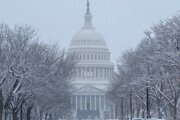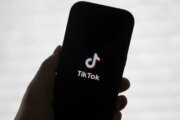TOKYO (AP) — For many Japanese survivors of the U.S. atomic bombings of Hiroshima and Nagasaki and their relatives, Friday’s awarding of the Nobel Peace Prize to a Japanese organization against nuclear weapons gives them hope for a new momentum to push for a nuclear-free world — starting from getting their own government to sign the nuclear weapons ban treaty.
Nihon Hidankyo, an organization of survivors of the two U.S. atomic bombings, became the first Japanese recipient of the Nobel Peace Prize in 50 years since the late Prime Minister Eisaku Sato was honored in 1974 for his contribution to regional stability and Japan’s signing of the Nuclear Non-Proliferation Treaty.
Toshiyuki Mimaki, the organization’s Hiroshima branch executive, was standing by at the city hall for the announcement. He cheered and teared up when he received the news. “Is it really true? Unbelievable!” Mimaki screamed, pinching his cheek with his fingers to make sure he was not dreaming.
“I believe the Nobel Peace Prize will give us more power to promote our cause toward achieving a world without nuclear weapons,” said Mimaki, who was exposed to atomic bombing at age 3 in Hiroshima, his father’s hometown, where he evacuated after surviving the U.S. air raid in Tokyo on March 10, 1945.
The group’s honor comes seven years after the International Campaign to Abolish Nuclear Weapons won the peace prize in 2017 for their contribution to the adoption of the Treaty on the Prohibition of Nuclear Weapons.
Hidankyo members have helped collect more than 3 million signatures in favor of the treaty, and demanded the reluctant Japanese government sign it and do more to lead the nuclear disarmament as the world’s only country to have suffered atomic attacks.
Former Prime Minister Fumio Kishida has been criticized by survivors for refusing to sign the Treaty on the Prohibition of Nuclear Weapon. He has argued that the pact is unworkable because no nuclear-armed state has signed.
Japanese leaders have repeatedly promised to serve as a middle ground between nuclear and non-nuclear states and stressed the need for dialogue toward nuclear disarmament, but refused to join the treaty even as an observer.
Atomic bombing survivors, or hibakusha, say Japanese leaders are only making hollow promises because Japan relies on the U.S. nuclear umbrella for protection and has been rapidly expanding its military.
“As hibakusha, it is extremely sad to see the Japanese government has not signed or ratified the nuclear weapons ban treaty,” said Terumi Tanaka, 91, a Hidankyo executive who survived the Nagasaki bombing at age 13. “I hope the Nobel Peace Prize opens up a chance to get the Japanese government to take the step.”
Tanaka said the prize is timely in a world increasingly facing the threat of nuclear weapons.
“Sadly, I think many people around the world still don’t understand how inhumane nuclear weapons are,” he said, adding that it is “a good chance for them to think about what we’ve kept saying all along.”
Japan, the United States and other regional partners have been stepping up security cooperation in response to a more assertive China and the growing nuclear and missile threats from North Korea and Russia. Japan has sought stronger U.S. protection by its nuclear capability.
Japan’s new Prime Minister Shigeru Ishiba, a security expert who took office this month, is an advocate of a NATO-style collective defense framework in Asia.
“It is extremely meaningful,” Ishiba said of the Hidankyo’s honor at a news conference from Vientiane where he attended the Association of Southeast Asian Nations.
In Tokyo, many expressed surprise and joy as workers distributed a special newspaper edition on Hidankyo’s winning of the peace prize.
“I would be happy if this award can be an opportunity to make the people around the world think,” said Sayaka Nakanishi, a high school teacher.
Hiroshima Gov. Hidehiko Yuzaki, an advocate of nuclear disarmament, said Hidankyo’s win meant “the Nobel Foundation was warning against an international trend toward stronger nuclear armament.”
“We should really take the meaning of the award seriously and think about what they mean when hibakusha say they don’t want anyone else to suffer the same ordeal,” he said.
Many survivors of the bombings have suffered lasting injuries and illnesses resulting from the explosions and radiation exposure and have faced discrimination in Japan. Aging survivors are also worried about how to keep their stories alive for younger generations.
Nagasaki Mayor Shiro Suzuki, whose parents were hibakusha, expressed hope that the international recognition for Hidankyo will help inspire younger generations around the world.
The atomic bomb dropped by the United States on Hiroshima on Aug. 6, 1945, killed 140,000 people, and a second bomb dropped on Nagasaki three days later killed another 70,000. Japan surrendered on Aug. 15, 1945, ending World War II and its nearly half-century of aggression across Asia.
Hidankyo was formed 11 years later in 1956, amid a growing anti-nuclear movement in Japan in response to U.S. hydrogen bomb tests in the Pacific that led to a series of radiation exposures by Japanese boats and added to demands for government support for health problems.
As of March, 106,823 survivors — 6,824 fewer than a year ago, and now with an average age of 85.6 — are certified as eligible for government medical support, according to the Health and Welfare Ministry. Many others, including those who say they were victims of the radioactive “black rain” that fell outside the initially designated areas of Hiroshima and Nagasaki, are still without support.
—-
This version corrects the name of the Hiroshima branch executive to Toshiyuki Mimaki, not Tomoyuki Mimaki.
___
Associated Press video journalist Ayaka McGill contributed.
Copyright © 2025 The Associated Press. All rights reserved. This material may not be published, broadcast, written or redistributed.





